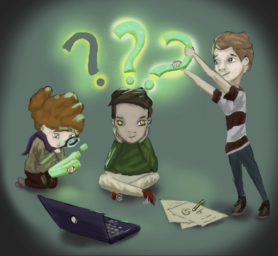SSIBL (Socio-Scientific Inquiry Based Learning)

|
Lesaanpak binnen STEM: Socio-Scientific Inquiry-Based Learning (afgekort SSIBL).
Deze aanpak combineert socio-scientific issues en burgerschapsvorming met onderzoekend leren. |
| Sociaal-wetenschappelijke vraagstukken zijn controversiële, maatschappelijk relevante, reële problemen die door de wetenschap zijn onderbouwd en vaak een ethische component hebben. | Socioscientific issues are controversial, socially relevant, real-world problems that are informed by science and often include an ethical component (Sadler, Barab, and Scott, 2007). |
Toelichting video Parrise
[collapsibles]
[collapse title=”Onderzoekend leren (IBL)”]
Bij onderzoekend leren denkt u misschien als eerst aan onderzoek doen door leerlingen zelf. Maar hebt u er wel eens aan gedacht dat u de didactiek van onderzoekend leren ook kunt inzetten bij het werken aan burgerschapsvorming?
Onderzoekend leren is een didaktiek die enthousiasme, betrokkenheid en intrinsieke motivatie van leerlingen bevordert. Daarnaast werk je door middel van onderzoekend leren aan diverse vaardigheden zoals samenwerken, presenteren en analyseren. Deze didactiek leent zich ook goed voor het werken aan burgerschapsvorming.
Onderzoekend leren is een wijze van lesgeven waarin leerlingen zelf actief op zoek gaan naar het antwoord op hun onderzoeksvraag (Van Baren-Nawrocka, Dekker & Peeters, 2016). Dit sluit aan bij de nieuwsgierigheid die leerlingen van nature hebben, en stimuleert hun betrokkenheid en intrinsieke motivatie bij het leren (Peeters, Arntz & Mourad, 2014). Het zelf op onderzoek uitgaan en zelf dingen ontdekken leidt niet alleen tot een sterkere toename in betrokkenheid en motivatie, maar ook in conceptuele kennis (Minner, Levy & Century, 2010). Daarnaast vergroot het de kennis van hoe wetenschappelijke kennis tot stand komt, en doet het een beroep op de kritische houding van leerlingen.
[/collapse]
[collapse title=”IBL en socio-scientific issues -> SSIBL”]
Bij onderzoekend leren is het belangrijk dat leerlingen gaan beseffen dat wetenschap een doorgaand proces van waarheidsvinding is, en dat er geen absolute waarheid is. In het kader van burgerschapsvorming is het bovendien belangrijk dat zij zich realiseren dat wetenschappelijke kennis kan botsen met sociale, politieke en/of ethische standpunten. Wat hebben wetenschappelijke innovaties voor consequenties voor ons? Wat betekent het dat we DNA-codes kunnen lezen? Moeten we nu allemaal ons DNA gaan afstaan om eventuele ziektes die op de loer liggen op te sporen, of om te bewijzen dat wij niet de dader zijn van een misdrijf? Deze controversiële aspecten van wetenschap krijgen vaak nog weinig aandacht in het onderwijs.
[/collapse]
[collapse title=”Engelse samenvatting”]
The SSIBL concept tries to bring together responsible and collaborative public involvement in scientific research and innovation and an emphasis on social justice with inquiry through socio-scientific issues.
SSIBL is a novel pedagogical framework which connects the study of socio-scientific issues, inquiry-based learning and citizen education. In its essence, it is an ongoing development, blending together aspects of scientific inquiry which, oftentimes, have been examined in isolation.
This framework is directed to supporting teacher education both at the pre-service and in-service levels. In recognising the importance and innovativeness of these approaches, a scheme for scaffolding pedagogy has been incorporated so that teachers can build confidence together as they acquire the relevant skills.
[/collapse]
[collapse title=”Verwijzingen”]
- Amos, R., Knippels, M.-C. and Levinson, R. (2020). Socio-Scientific Inquiry-Based Learning: Possibilities and Challenges for Teacher Education Contemporary Trends and Issues in Science Education, 41–61. doi:10.1007/978-3-030-40229-7_4 .
- Ariza, M. R., Abril, A. M., Quesada, A. and García, F. J. (2014). Bridging inquiry based learning and science education on socio scientific issues: contributions to the parrise european project, INTED2014.
- Guérin, L., Klaver, L., Walma van der Molen, J. and Sins, P. (2021). Onderzoeksrapport Samen werken aan Bèta Burgerschap (PDF) (pp. 60). Deventer: TechYourFuture.
- Klaver, L. (2021). Measuring Pupils’ Attitudes Towards Socioscientific Issues (PDF) Science & Education, 30(3), 1-28. doi:10.1007/s11191-020-00174-y .
- Klaver, L. (2023). Attitudes toward socioscientific issues as outcome of citizenship education, Citizenship Education. Brussel.
- Klaver, L., Walma van der Molen, J., Sins, P. and Guérin, L. (2022). Students’ engagement with Socioscientific issues: Use of sources of knowledge and attitudes (PDF) Journal of Research in Science Teaching. doi:10.1002/tea.21828 .
- Klaver, L. T., Sins, P. H. M., Walma van der Molen, J. H. and Guérin, L. J. F. (2022). Strengthening Science Education Through Attention to Student Resources: A Conceptualization of Socioscientific Capital (PDF) Journal of Research in Science Teaching. doi:10.1002/tea.21827 .
- Knippels, M. C. P. J. (Ed.). (2018). PARRISE Final Conference – Report. Science and society in education. Promoting Responsible Research and Innovation through Science Education (PDF). Utrecht: Utrecht University.
- Knippels, M. C. P. J., van Dam, F. and Van Harskamp, M. (Eds.). (2017). Socio-Scientific Inquiry-Based Learning: connecting formal and informal science education with society (PDF). Utrecht: Utrecht University / Parrise.
- Knippels, M. C. P. J. and Van Dam, F. W. (2017). PARRISE, Promoting Attainment of Responsible Research and Innovation in Science Education, FP7 : Rethinking science, rethinking education (PDF) Impact, 2017(5), 52 – 54. .
- Knippels, M. C. P. J. and van Harskamp, M. (2018). An educational sequence for implementing socio-scientific inquiry-based learning (SSIBL) (PDF) School Science Review, 100(371), 46-52. .
- Levinson, R. (2018). Introducing socio-scientific inquiry-based learning (SSIBL) (PDF) School Science Review, 100(371), 31-35. .
- Sadler, T. D., Barab, S. A. and Scott, B. (2007). What do Students Gain by Engaging in Socioscientific Inquiry? Research in Science Education, 37(4), 371-391. doi:10.1007/s11165-006-9030-9 .
[/collapse]
[/collapsibles]
U moet ingelogd zijn om een reactie te kunnen plaatsen.


